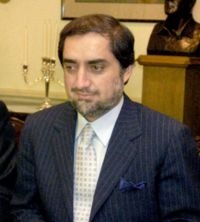Though it was not widely publicized at the time, the weekend deal on Afghanistan’s disputed presidential election included a wholesale reshaping of the Afghan system of governance, transitioning toward a more parliamentary system.
 This means whether Abdullah Abdullah or Ashraf Ghani ultimately gets the presidency, they will not enjoy the unchecked, dictatorial powers of outgoing President Hamid Karzai, and the official will be much weaker going forward.
This means whether Abdullah Abdullah or Ashraf Ghani ultimately gets the presidency, they will not enjoy the unchecked, dictatorial powers of outgoing President Hamid Karzai, and the official will be much weaker going forward.
Instead, Afghanistan will have a prime minister with considerable power, and while the details are still not worked out it appears that the president will be expected to appoint the loser to an interim position as “chief executive,” a position which would be eventually replaced by a premier.
A parliamentary system had been advocated by Abdullah in the past, but resisted by Karzai, who had insisted on having absolute power over government affairs, and used that power to keep control of the organization of elections, giving him an insurmountable advantage in his reelection campaign.


